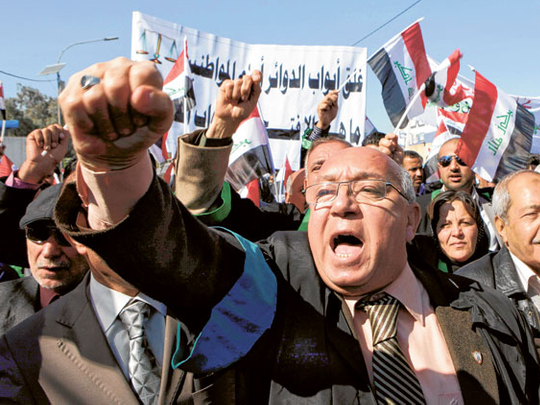
Iraq has not seen stability since the downfall of Saddam Hussain's regime on April 9, 2003. The reasons may be attributed to many political, security and economic factors that have been studied intensively by analysts and used by officials as an excuse to justify their failures.
Violence in Iraq has not ceased over the past eight years, however, it ebbed and flowed and confused Iraq's security forces.
The region has also seen organised campaigns jeopardising security at both the individual and collective levels. We have witnessed the assassination of former high ranking army officers, the killing of professors, scientists, physicians and technocrats.
Ethnic minority and religious groups were also exposed to killings and displacement, which included Christians in Mosul and Basra, and the targeting of other religious minorities who have lived in Iraq for thousands of years, and were a part of Iraq's social fabric.
We have observed mindless sectarian violence by extremists which has resulted in the loss of thousands of lives after the bombing in Samara of the two Al Askari shrines.
In addition to that, we have also seen individual and collective abductions, the occupation of government buildings, mosques and churches where people were taken hostage by terrorist groups. We have also witnessed the interference of special forces, which only led to loss of more innocent life.
Lately, we have seen a new wave of assassinations of security forces' members and we continue to see an organised campaign to take out media personalities. On March 29 in Tikrit, the governorate's building was taken over by a terrorist group for hours. The operation ended only when special forces came from the capital Baghdad to end the siege which resulted in 150 people killed and injured.
This violence usually coincides with important political or community events, such as the Local Council elections.
They also take place when an important foreign delegation or personality is on a visit. Religious events are also targets, and as they are numerous in Iraq, the time separating terrorist acts is fairly short. Iraq has also become a battleground for different regional forces, warring against each other.
The latest violence in Tikrit comes as an additional proof of the fragile security situation in Iraq, and the inability of those in responsible places to correctly read the security and political scene in the country. The controversy can be seen clearly in Prime Minister Nouri Al Maliki's recent statement, claiming that Iraq has become the leader in security and stability among the region's countries, after being the most unstable and unsafe country in the region.
Reason for suspicion
Since the downfall of the former regime in 2003, Iraq has seen grave events that resulted in almost a million deaths, including those of prominent members of society needed by the community for their knowledge and skills. And whenever a major violent operation takes place, we hear that the Iraqi government is about to set up a high-ranking investigative body to look into the matter. However, the public is never informed about the results of the investigations.
After all these years, we still don't know who bombed the two Al Askari Shrines in Samara, or who was behind the assassination of Iraqi pilots, Iraqi experts and technocrats.
We still don't know who killed and displaced hundreds of university professors, doctors, and media personalities. The secrecy and cover up is a good reason for suspicion.
Moreover, if the investigative committees have discovered the identity of the criminals, why aren't the culprits brought to justice and put on trial in the open, like officials of the former regime were tried?
Aren't the crimes committed against Iraqi minorities a form of genocide and mass killings that need conclusive measures to expose the groups responsible? Or is the cover up a political necessity?
Who are the groups behind the criminal acts of today? Why are the security authorities unable to prevent these crimes?
There are many groups, inside Iraq and abroad, that are responsible for the bloodshed and there is no doubt the authorities have a lot of information about the criminals and terrorists, as they usually conduct huge numbers of arrests and investigations after every bloody event.
The big worry is that despite the number of security forces and their mega budget, they stand helpless in preventing the crimes. Furthermore, their intervention comes late and is insufficient.
The violence file in Iraq is far from being closed because the political crisis still exists. Solutions to these problems will not be easily found.
Dr Mohammad Akef Jamal is an Iraqi writer based in Dubai.









